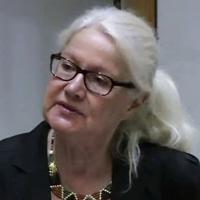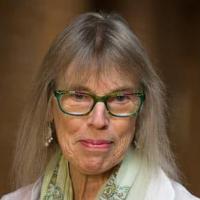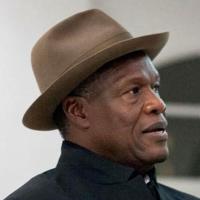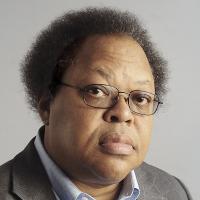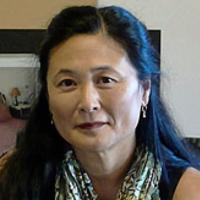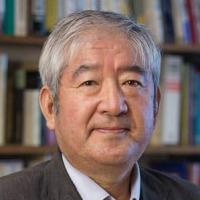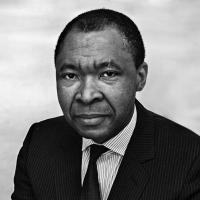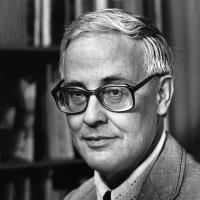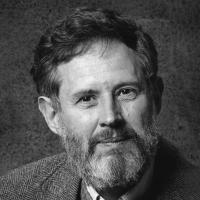SUSAN BUCK-MORSS
Susan Buck-Morss is a trans-disciplinary scholar whose political theory emerges out of a constellation of historical material, visual images, and contemporary events. Her training is in Continental Theory, specifically, German Critical Philosophy and the Frankfurt School. Currently a core faculty member of the City University of New York (CUNY) Graduate Center’s Committee on Globalization and Social Change, she was professor at Cornell University’s Department of Government, where she is now a Professor Emeritus.
Her book, Hegel, Haiti, and Universal History (2009), won the Frantz Fanon Prize Book Prize in 2011. Her book, Thinking Past Terror: Islamism and Critical Theory on the Left (2003), has been translated into Hebrew, Urdu, Spanish, Japanese, and Greek. Research for her book Dreamworld and Catastrophe: The Passing of Mass Utopia in East and West (2000) was funded by awards from the MacArthur Foundation, Rockefeller Foundation, and the Fulbright program. Her early studies on the Frankfurt School are Dialectics of Seeing: Walter Benjamin and the Arcades Project (1989) and The Origin of Negative Dialectics: Theodor W. Adorno, Walter Benjamin, and the Frankfurt School (1979). She is currently writing on the philosophy of history: History as the Cosmology of Modernity.
BRETT DE BARY
Brett de Bary holds a joint appointment with the Department of Asian Studies and the Department of Comparative Literature at Cornell. Her research interests include modern Japanese fiction and film; the Japanese post-modern; comparative literary theory, translation theory and post-colonial theory; and gender and philosophy. She is currently writing a book on translation, as practice and theory, in the work of contemporary artists and intellectuals like Tawada Yoko, Morisaki Kazue, Lee Chonghwa, Ukai Satoshi, and others.
Most recently, she has co-edited and co-translated with Rebecca Jennison Lee Chonghwa’s Still Hear the Wound (Cornell East Asia Series, 2015), a volume of essays on contemporary installation, dance, video, and other art works dealing with issues of post-colonial memory in Japan. Ito Tari, Oh Haji, Soni Kum, and Yamashiro Chikako are among the artists featured in the book. Her essay on video artist Soni Kum has appeared in Asian Cinema (2015), and on Tawada Yoko in Poetica (2012) and in The Politics of Representation edited by Richard Calichman and John Kim (2010). For Traces: A Multilingual Series of Cultural Theory and Translation, she has edited Universities in Translation: The Globalization of Mental Labor (HKUP, 2010). Deconstructing Nationality, which she co-edited with Naoki Sakai and Iyotani Toshio, was published by the Cornell East Asia Series in 2005.
MANTHIA DIAWARA
Manthia Diawara is a writer, filmmaker, cultural theorist, scholar, and art historian. Diawara holds the title of University Professor at New York University, where he is also Director of the Institute of African American Affairs. Born in Mali's capital Bamako, Manthia Diawara spent his youth in Guinea until 1964 when his family was expelled from the country by the regime of Ahmed Sékou Touré. Diawara went on to study in France and the United States. He established the Africana Studies Program at NYU in 1992.
Diawara has written extensively on the films and literature of the Black Diaspora. He is the author of Black-American Cinema: Aesthetics and Spectatorship (1993), African Cinema: Politics and Culture (Indiana 1992), and In Search of Africa (Harvard University Press, 1998). In 2003, Diawara released We Won’t Budge: A Malaria Memoir, the title a tribute to Salif Keita’s anthemic protest song “Nou Pas Bouger.” Other books include Bamako-Paris-New York (2007), a comparison of social systems and race relations in America and France, and African Film: New Forms of Aesthetics and Politics (2010). As a filmmaker, Diawara has collaborated with the renowned Kenyan writer Ngûgî wa Thiong’o in making the documentary Sembene Ousmane: The Making of the African Cinema (1994) and directed the German-produced documentary Rouch in Reverse (1995). More recently, Diawara directed and produced Bamako Sigi-Kan (2003), an intimate look at his hometown. Diawara is a founding editor of Black Renaissance Noire.
GEORGE E. LEWIS
George E. Lewis is the Edwin H. Case Professor of American Music at Columbia University. A Fellow of the American Academy of Arts and Sciences and a Corresponding Fellow of the British Academy, Lewis’s other honors include a MacArthur Fellowship (2002), a Guggenheim Fellowship (2015), a United States Artists Walker Fellowship (2011), an Alpert Award in the Arts (1999), and fellowships from the National Endowment for the Arts. A member of the Association for the Advancement of Creative Musicians (AACM) since 1971, Lewis's work in electronic and computer music, computer-based multimedia installations, and notated and improvisational forms is documented on more than 150 recordings by various orchestras, symphonies, and musical collectives. Lewis has made over 120 recordings as composer or performer, and his publications on experimental music appear regularly in scholarly and popular journals.
Lewis received the 2012 SEAMUS Award from the Society for Electro-Acoustic Music in the United States, and his book, A Power Stronger Than Itself: The AACM and American Experimental Music (University of Chicago Press, 2008) received the American Book Award and the American Musicological Society’s Music in American Culture Award; Lewis was elected to Honorary Membership in the Society in 2016. Lewis is the co-editor of the two-volume Oxford Handbook of Critical Improvisation Studies (2016), and his opera Afterword (2015), commissioned by the Gray Center for Arts and Inquiry at the University of Chicago, has been performed in the United States, United Kingdom, and the Czech Republic. In 2015, Lewis received the degree of Doctor of Music (DMus, honoris causa) from the University of Edinburgh. In 2017, Lewis received the degree of Doctor of Humane Letters (PhD, honoris causa) from New College of Florida.
LISA LOWE
Lisa Lowe is Samuel Knight Professor of American Studies at Yale University. Her research and teaching focuses on literatures and cultures of encounter that emerge from histories of colonialism, migration, and globalization. She is the author of books on the literatures of French and British colonialisms, on Asian immigration to the United States, and on transnational debates on the concept of culture.
Her first book Critical Terrains: French and British Orientalisms (1991), examined the intersections of culture, class, and sexuality in French and Anglo-American literature, letters, and theory. Immigrant Acts: On Asian American Cultural Politics (1996), analyzed the contradictions of Asian immigration to the United States, observing that Asian immigrants have been included in the workplaces and markets of the U.S., yet through exclusion laws and bars from citizenship, are distanced from national culture and constructed as perpetual immigrants or "foreigners-within." Immigrant Acts is frequently cited as a central text in Asian American studies. Her most recent book, The Intimacies of Four Continents (2015), is a study of settler colonialism, transatlantic African slavery, and the East Indies and China trades in goods and people as the conditions for modern European liberalism and empire. Lowe serves on the editorial board of the Journal of Asian American Studies and on the advisory board of the feminist academic journal Signs. Since 2001, Lowe has co-edited with Jack Halberstam, "Perverse Modernities," a book series for Duke University Press.
TIMOTHY MITCHELL
Timothy Mitchell is a political theorist and historian. He holds a joint appointment from the School of International and Public Affairs and the Department of Middle Eastern, South Asian and Africa Studies, Columbia University. His areas of research include the place of colonialism in the making of modernity, the material and technical politics of the Middle East, and the role of economics and other forms of expert knowledge in the government of collective life.
Mitchell is the author of Colonising Egypt (1991), a study of the emergence of modern modes of government in the colonial period. His edited volume Questions of Modernity (2000) brought together the work of scholars of both South Asia and the Middle East. In the field of Middle East politics, he has published a number of essays on agrarian transformation, economic reform, and the politics of development. Rule of Experts: Egypt, Techno-Politics, Modernity (2002) examined the creation of economic knowledge and the making of “the economy” and “the market” as objects of twentieth-century politics. He brought together the fields of STS, political economy, and postcolonial theory in his book Carbon Democracy (2012) which examines how the possibilities for democratic politics have been expanded or closed down in the construction of modern energy networks. Several of his writings have been translated and published in Arabic, including three further books of essays, as well as in Persian, Hebrew, Turkish, Japanese, and a number of European languages.
NAOKI SAKAI
Naoki Sakai is the Goldwin Smith Professor of Asian Studies at Cornell University, where he holds a joint appointment with Asian Studies and Comparative Literature departments. He has published in a number of languages in the fields of comparative literature, intellectual history, translation studies, the studies of racism and nationalism, and the histories of semiotic and literary multitude - speech, writing, corporeal expressions, calligraphic regimes, and phonographic traditions.
Sakai is the author of Voices of the Past: The Status of Language in Eighteenth-Century Japanese Discourse (1992) and Translation and Subjectivity: On Japan and Cultural Nationalism (2007), along with numerous essays and book chapters in multiple languages. He leads TRACES, a multilingual series in eight languages, and served as its founding senior editor from 1996 - 2004. In addition to TRACES, Naoki Sakai is a member of the following editorial boards: positions; asia critique (United States), Post-Colonial Studies (Australia), Tamkang Review (Taiwan), International Dictionary of Intellectual History (Britain and Germany), Modern Japanese Cultural History (Japan), ASPECTS (South Korea) and Multitudes (France).
SHIRLEY SAMUELS
Shirley Samuels is Professor of English at Cornell University. She is currently working on two projects, an edited book on race and visuality in the nineteenth century United States and another monograph, currently titled "Democratic Witness," on witnessing, testimony, and culture in the United States. She teaches at Cornell in several departments, including American Studies, English, History of Art and Visual Studies, and Feminist, Gender, and Sexuality Studies.
Her books include The Cambridge Companion to Abraham Lincoln (2012), Reading the American Novel 1780-1865 (2012), Facing America: Iconography and the Civil War (2004); Companion to American Fiction, 1780-1865 (2004); Romances of the Republic: Women, the Family, and Violence in the Literature of the Early American Nation (1996); and The Culture of Sentiment: Race, Gender, and Sentimentality in 19th Century America (1992). In addition to Cornell, she has taught at Princeton University, Brandeis University, and the University of Delaware. She has held fellowships from The American Council of Learned Societies, the Library Company of Philadelphia, the American Antiquarian Society, and the Huntington Library. She is the recipient of a 2017 Public Voices fellowship, funded by the Cornell Office of Faculty Development and Diversity and the non-profit organization the OpED Project, that seeks to diversify the demographics of public discourse.
EMERITI
OKWUI ENWEZOR (1963-2019)
The Cornell community mourns the loss of Okwui Enwezor, distinguished writer and extraordinary curator, and who was a member of our Advisory Board since the founding of ICM over ten years ago. The many major groundbreaking exhibitions and platforms he realized have decisively transformed scholarship and curation of modern and contemporary art. He was a mentor and example to numerous emerging scholars and curators from across the world. His legacy exemplifies the ongoing labor of decolonization, in imagining global modern and contemporary culture beyond canonical hierarchies and towards greater equality.
BENEDICT ANDERSON (1936-2015)
Benedict Anderson (ICM 2007-2015) was Aaron L. Binenkorb Professor Emeritus of International Studies, Government and Asian Studies at Cornell University. He is best known for his transformative, celebrated book Imagined Communities, first published in 1983. In 1957, Anderson received a Bachelor of Arts in Classics from the University of Cambridge, and he later earned a Ph.D. from Cornell’s Department of Government, in the area of Indonesian Studies, and remained at Cornell for his entire career, from 1967 until his retirement in 2002.
A beloved teacher, mentor, and a prolific scholar, with more than 250 published scholarly articles, as well as other authored books, Anderson pursued a lifelong commitment to detailed study of Indonesia, Thailand and the Philippines. His other book titles include Java in a Time of Revolution (1972); In the Mirror: Literature and Politics in Siam in the American Era,” (1985); Language and Power: Exploring Political Cultures in Indonesia,” (1991); and Under Three Flags: Anarchism and the Anticolonial Imagination (2005).
MARTIN BERNAL (1937-2013)
Martin Bernal (ICM 2007-2013) was Professor Emeritus of Government and Near Eastern Studies at Cornell from 1971 until his retirement in 2001. His three-volume work on “Black Athena” was a decades-long project that foregrounded ancient Egyptian and Afroasiatic culture, rather than Greece, as the basis of ancient culture. His work and its critical reaction formed the basis of later courses and lectures on the politics of scholarship in Near Eastern Studies. Professor Bernal studied at Cambridge University, Peking University, University of California, Berkeley, and Harvard University, and is remembered at Cornell as a longtime faculty fellow at Telluride House. Bernal’s first volume in the Black Athena series was, The Fabrication of Ancient Greece 1785-1985 (1987) followed by further research in Black Athena 2: The Archaeological and Documentary Evidence (1991) and Black Athena 3: The Linguistic Evidence (2006), as well a volume in response to critics, “Black Athena Writes Back” (2001). The series was widely translated and became the subject of conferences, radio and television programs. Bernal’s other books include Chinese Socialism Before 1907 (1976); and Cadmean Letters: The Westward Diffusion of The Semitic Alphabet Before 1400 B.C. (1990).

